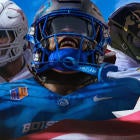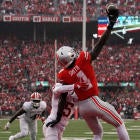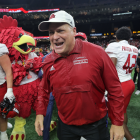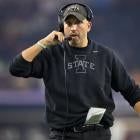Name, image and likeness supporters may have a potential new advocate: the Trump administration. A White House spokesman told CBS Sports this week the Trump administration is evaluating whether "it would be appropriate for the federal government to become involved with policy solutions" regarding the fair treatment of college athletes.
CBS Sports sought comment from the administration after two sources said there had been at least one meeting between the Trump White House and individuals involved in developing name, image and likeness rights for athletes.
"The White House wants to make sure NCAA student-athletes are treated fairly without harming the integrity of college sports," said Judd Deere, White House deputy press secretary, when asked about that meeting. "Administration officials are in the process of learning about these issues, as well studying if it would be appropriate for the federal government to become involved with policy solutions."
Deere, who is also special assistant to the President, said he would not comment further.
"It's very real," said a source familiar with the situation regarding the interest between the two parties.
All of this comes at a time when the NCAA seems to be seeking federal intervention in figuring out how to implement name, image and likeness rights. California has passed a law that will take effect in 2023. Currently, at least 16 other states are developing bills. Florida's law may be the most advanced at this point. It is scheduled to be ratified in April and take effect July 1.
Ohio State athletic director Gene Smith said there could be "chaos" if Florida enacts the law at the same time the NCAA is still figuring out its path on name, image and likeness.
"Florida's in the SEC. What does that mean to the other SEC schools [if Florida athletes have these rights]?" Smith asked recently.
The California bill has a more liberalized compensation component than the Florida bill.
"If you have seven states with different laws and those states are operating within those laws because they have to, I don't know what that means," Smith added. "Imagine if California didn't work with us to change the [effective] date to 2023 and it was 2020. What would Oregon do? What would Arizona State do? What does the Pac-12 do?
"That's the chaos that could happen."
While it's not clear who from either side is involved in the talks, the NCAA doesn't appear to be involved in these particular discussions with the White House described above.
"State governments and the federal government don't want to talk to the NCAA," said a high-ranking source in a state considering such legislation. "But they do want to talk to the conferences. The schools and the conferences … that's the ones they want to hear from. Conference leaders still have credibility."
NCAA president Mark Emmert met with legislators in December in Washington, D.C. after decades of the association fighting any kind of federal government intervention into its affairs.
At the time Emmert said he spoke to White House officials "who don't seem opposed to the idea" of name, image and likeness rights. The NCAA Board of Governors in October directed the membership to begin exploring changes allowing athletes to "benefit from" their name, image and likeness.
"We appreciate the interest of the White House and administration officials and share their interest in making sure that student-athletes are treated fairly without harming the integrity of college sports," said Emmert on Friday when contacted by CBS Sports. "We look forward to continuing our dialogue with them."
What all of this looks like going forward remains murky. NCAA rules continue to limit athletes to the scholarship basics: books, board, tuition, fees and cost of attendance. They also have access to dedicated academic benefits such as tutoring. Bylaw changes have also allowed enhanced meal options that mean athletes can get three square meals a day from the training table.
Those rules do not permit athletes to profit from such outside benefits as autograph signings, commercial endorsements and group licensing agreements. Such opportunities would be the first exploited if name, image and likeness rights are granted.
While the NCAA is open to what would be radical change to the so-called "collegiate model," it can't figure out exactly how to do it.
In January, Emmert said that Board of Governors formed a group of school presidents to answer a basic question: What does the NCAA want out of potential federal intervention on the issue?
Any formal federal legislation would have to go through the usual pipeline. A bill would have to be submitted, then vetted by both the House of Representatives and Senate before being signed by the President.
Wisconsin chancellor Rebecca Blank expressed her doubt federal intervention while speaking to the school's athletic board last week.
"I will tell you why we've never gone to federal legislation before: Once you go to the feds, the legislature and the Congress and say, 'Hey, we'd like you to write some legislation for us.' They have their own ideas," Blank was quoted as saying in the Wisconsin State Journal. "And not all of their ideas, in my mind, are completely sane and would make sense for college athletics."
Smith is also co-chair of a working group that is expected to present recommendations to the Board of Governors on name, image and likeness rights in April. By the end of the month, the NCAA could be advancing the initiative to ask Congress to develop overarching legislation. If not, those states are ready to step in with laws that could stoke a legal battle between the NCAA and state governments.
"There is something to be said about chaos. It's not like the end of the world. It may actually help make the case," said former Maryland Congressman Tom McMillen.
McMillen pointed out that the NCAA would have trouble getting injunctions stopping name, image and likeness laws popping up in multiple states in a short time span. State and federal intervention in the debate has become so attractive because it is a bipartisan issue. Politicians can sell the name, image and likeness rights cause to their constituents as student-athlete welfare.
Florida Gov. Ron DeSantis has supported the Florida bill sponsored by Florida Rep. Chip LaMarca. Both are Republicans.
"It's hard to understate the significance," said South Florida attorney Darren Heitner, who helped write the Florida bill. "It's huge. The fact that you have a Republican governor and Republican sponsor of the legislation, a bill that is largely assumed to be something that is part of a liberalist agenda [is positive]."
















